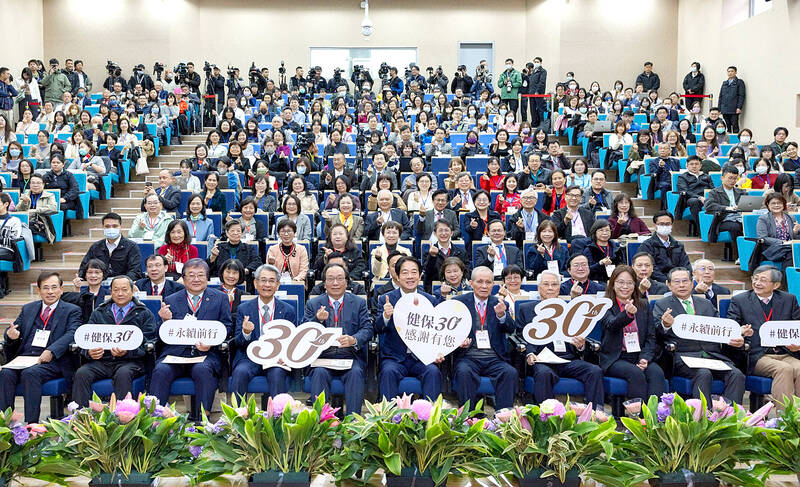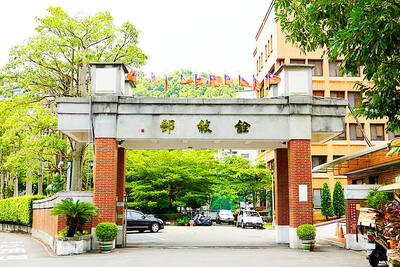President William Lai (賴清德) yesterday lauded the achievements and impact of the National Health Insurance (NHI) system ahead of the 30th anniversary of its introduction as a compulsory health insurance program.
“Thank you to the NHI system and the various functions it has served over the past 30 years — it is like a ‘guardian mountain’ that safeguards the nation, protecting everyone’s health under the system,” Lai said at a symposium held in Taipei to discuss the sustainable development of the NHI system ahead of its 30th anniversary on March 1.
Lai, a former physician, in his opening speech said that before the implementation of the NHI system, many people in Taiwan fell into a vicious cycle of illness and financial hardship, where “poverty led to illness, and illness, in turn, led to poverty,” causing widespread social problems.

Photo: screen grab from the Presidential Office’s Flickr
One example he raised was how, in the past, a single illness in a family could prevent children from continuing their education, as medical expenses consumed a significant portion of household income.
Lai said that almost all social issues caused by health-related burdens have been resolved over the past 30 years due to the NHI system, which he praised as a crucial mechanism for “social redistribution.”
“It [the NHI system] enables everyone to embrace the spirit of mutual support and insurance, while also incorporating elements of social welfare through government participation,” he said.
Noting that the NHI system currently has a coverage rate of about 99 percent, the president said: “No other country in the world has a health insurance system with such a high proportion [of coverage].”
In terms of international recognition, Lai, who has been pushing the “Healthy Taiwan” policy initiative since taking office in May last year, said that Taiwan’s healthcare system has ranked first in the world for six consecutive years, citing the Health Care Index by the online database Numbeo.
The index evaluates the overall quality of a nation’s healthcare system, including factors such as healthcare professionals, equipment, staff, doctors and costs, as shown on Numbeo’s Web site.
However, Lai acknowledged the challenges facing the NHI system, noting a current shortage of medical professionals across multiple specialties, particularly in internal medicine, surgery, pediatrics, and obstetrics and gynecology.
“If this issue remains unresolved in the long run, it will inevitably be detrimental to the public,” Lai said, without providing suggestions on how to address the problem.
In a documentary screened at the symposium, it was noted that after the COVID-19 pandemic, a considerable number of doctors opted to open private clinics or shift to aesthetic medicine, which is not covered by the NHI system and is paid for by patients themselves, to “escape the constraints” of the system.
The film highlighted that recruiting talent for certain specialties remains a challenge, particularly in fields related to life-saving medical services, such as intensive care.

Taiwan Semiconductor Manufacturing Co (TSMC, 台積電) is expected to start construction of its 1.4-nanometer chip manufacturing facilities at the Central Taiwan Science Park (CTSP, 中部科學園區) as early as October, the Chinese-language Liberty Times (the Taipei Times’ sister newspaper) reported yesterday, citing the park administration. TSMC acquired land for the second phase of the park’s expansion in Taichung in June. Large cement, construction and facility engineering companies in central Taiwan have reportedly been receiving bids for TSMC-related projects, the report said. Supply-chain firms estimated that the business opportunities for engineering, equipment and materials supply, and back-end packaging and testing could reach as high as

CHAMPIONS: President Lai congratulated the players’ outstanding performance, cheering them for marking a new milestone in the nation’s baseball history Taiwan on Sunday won their first Little League Baseball World Series (LLBWS) title in 29 years, as Taipei’s Dong Yuan Elementary School defeated a team from Las Vegas 7-0 in the championship game in South Williamsport, Pennsylvania. It was Taiwan’s first championship in the annual tournament since 1996, ending a nearly three-decade drought. “It has been a very long time ... and we finally made it,” Taiwan manager Lai Min-nan (賴敏男) said after the game. Lai said he last managed a Dong Yuan team in at the South Williamsport in 2015, when they were eliminated after four games. “There is

Democratic nations should refrain from attending China’s upcoming large-scale military parade, which Beijing could use to sow discord among democracies, Mainland Affairs Council Deputy Minister Shen You-chung (沈有忠) said. China is scheduled to stage the parade on Wednesday next week to mark the 80th anniversary of Japan’s surrender in World War II. The event is expected to mobilize tens of thousands of participants and prominently showcase China’s military hardware. Speaking at a symposium in Taichung on Thursday, Shen said that Chinese Minister of Foreign Affairs Wang Yi (王毅) recently met with Indian Prime Minister Narendra Modi during a visit to New Delhi.

FINANCES: The KMT plan to halt pension cuts could bankrupt the pension fund years earlier, undermining intergenerational fairness, a Ministry of Civil Service report said The Chinese Nationalist Party (KMT) caucus’ proposal to amend the law to halt pension cuts for civil servants, teachers and military personnel could accelerate the depletion of the Public Service Pension Fund by four to five years, a Ministry of Civil Service report said. Legislative Speaker Han Kuo-yu (韓國瑜) on Aug. 14 said that the Act Governing Civil Servants’ Retirement, Discharge and Pensions (公務人員退休資遣撫卹法) should be amended, adding that changes could begin as soon as after Saturday’s recall and referendum. In a written report to the Legislative Yuan, the ministry said that the fund already faces a severe imbalance between revenue